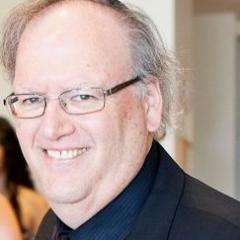
Volunteer of the Month: Cantor David Mannes
Cantor David Mannes works as a part-time Ritual Assistant at Beth Shalom Congregation, an egalitarian conservative congregation in Edmonton, Alberta, Canada. He also leads High Holiday services and does interim pulpit work throughout North America. A member of the ACC since 1993, David has a B.Ed. and M.Ed. He is a published writer and is the author of several works of fiction.
In what capacity have you volunteered for the ACC and how did you get started?
Penny Kessler was the first person to ask me to volunteer. I have been on the Communications Committee for about six years and have been involved in different facets of the committee. Penny asked me to take on Volunteer of the Month about three years ago. I felt it was important to give back and participate as a volunteer. Through the interviews, I have gotten to know a lot of our colleagues. It's been great to meet people and talk about their issues, concerns and to able to share.
Tell us a little about yourself.
My Dad was a cantor and a member of the Cantor's Assembly. I grew up in the business. Actually there is a rabbinic tradition going back nearly 200 years in my family. I originally didn't plan having a career in the cantorate. It seemed almost natural, but I had a lot of other career interests. But things happen, and there was a need at what was then the new Reform congregation Temple Beth Or in Edmonton. At that time they only had a student rabbi for high holidays. As needs arose, I continued my training under my father who was in Calgary by then. My responsibilities grew and I went from paid volunteer to professional. I applied and was accepted into the ACC/HUC certification program. I served Temple Beth Or as Cantor/Spiritual Leader for thirteen years.
What is the most rewarding aspect of your work?
Basically, it is seeing that you have a positive influence in people's lives, and it's also about the connections you make with the congregation. It's about making a difference. I have maintained contact with Rabbinic colleagues and congregants I have met at my High Holiday and interim pulpits and have kept in touch with many of them over the years. During the time I have been in Edmonton, I have had the opportunity to officiate throughout the lifecycle, from a bris and baby naming, to bar mitzvah, and even, for some, their weddings.
Do you feel there are any differences serving a congregation in Canada?
Jewish communities in Canada tend to be more traditional. There are not a lot of Reform congregations in Canada as a whole, and there are only two Reform congregations in the province of Alberta. I get along really well with my rabbinic colleagues and that is important in this community.
What are some of the challenges that face the cantorate in the 21st century?
Economic problems in the States have caused a lot of congregations to fold and combine. And if budgets have to be cut in professional staff, the Cantor is sometimes the first to go. We need to be more marketable in terms of the range of our skills, and in marketing ourselves. In the conservative movement, I have noticed the trend toward more lay leadership on the bimah, especially here in Edmonton. Because music creates the ambience of the services and creates the motivation to pray, in some cases the full extent of our musical heritage is not being experienced. As Cantors, we have musical knowledge and training that lay people don't have. You have a fascinating cantorial and rabbinic pedigree.
Can you share a little about this?
My dad's family came from Germany. My paternal great-grandfather had a Yeshiva. There were ten kids in my grandfather's family: one daughter and eight boys. One son became a cantor and the rest became Chassidic or orthodox rabbis, two of whom emigrated to the U.S. in the 30s My father, Cantor Fred Mannes z”l, came from Germany to the States in 39 with my grandmother and attended to Anshe Emet Synagogue in Chicago. Cantor Moe Silverman z”l, a fifth generation chazzan, was there and my dad studied with him. My dad filled in for him during Sukkot when he was fifteen. Later, Dad began his formal cantorial studies at HUC in New York, but finished his studies at the Cantor's Institute in Chicago. He graduated in 1960. Shortly after that the Cantor͛s Institute got amalgamated with JTS. I have a distinct memory of Cantor Silverman͛s office. He had two humidors on his desk. One contained cigars, the other – candy.
Is there something you would like to share with your colleagues that they may not know about you?
I have a M.Ed. in instructional technology. My specialty is in designing curriculum and in designing and producing educational media. I've worked as a producer, director and scriptwriter doing educational and promotional film, video and cable television. I am also a professional writer. I sold my first article when I was twenty-five. My latest novel is a departure from my previous work. It is called "The Cantor's Son". Back in the late 60's and early 70's I teamed with a high school buddy John Miller to form a folk-rock duo. We called ourselves JOVE. We wrote a lot of our own songs. For the past few years I've been doing some solo gigs, and performing our material for events in the Jewish community.

